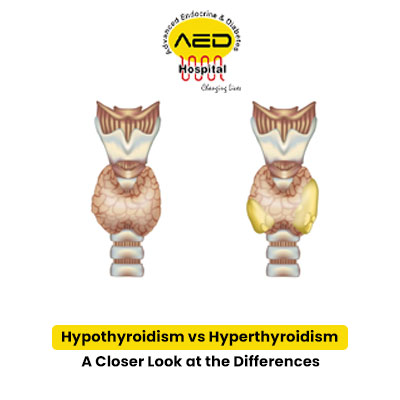Hypothyroidism vs Hyperthyroidism: A Closer Look at the Differences

PregnancyThe thyroid gland, a small butterfly-shaped organ located in the neck, plays a crucial role in regulating various bodily functions through the production of thyroid hormones. When the thyroid gland becomes imbalanced, it can lead to two distinct conditions: hypothyroidism and hyperthyroidism. In this blog, we will delve into the differences between these two thyroid disorders, including their causes, symptoms, and treatment approaches. AED Hospitals has the best Thyroid Specialists in KPHB, Hyderabad.
- Understanding Hypothyroidism :
Hypothyroidism is a condition where the thyroid gland does not produce enough thyroid hormones, primarily thyroxine (T4) and triiodothyronine (T3). This imbalance can slow down the body's metabolism and lead to various health issues.
- Causes :
Hypothyroidism is a condition that arises when the thyroid gland does not produce an adequate amount of thyroid hormones. The main causes include Hashimoto's thyroiditis, an autoimmune disorder where the immune system attacks the thyroid, and iodine deficiency, essential for hormone synthesis. Other factors encompass thyroid surgery, radiation therapy, certain medications, and congenital conditions. Identifying and addressing these causes are crucial for effective management and treatment of hypothyroidism.
- Symptoms:
- Fatigue and weakness
- Weight gain
- Cold sensitivity
- Dry skin and hair
- Constipation
- Muscle aches and joint pain
- Depression and memory problems
- Diagnosis and Treatment :
Hypothyroidism is diagnosed through blood tests that measure thyroid hormone levels and thyroid-stimulating hormone (TSH) levels. Treatment often involves thyroid hormone replacement therapy, where patients take synthetic thyroid hormones to restore normal levels in the body.
- Understanding Hyperthyroidism :
Hyperthyroidism is a medical condition where the thyroid gland becomes excessively active, resulting in an overproduction of thyroid hormones. This heightened metabolic state can cause a range of symptoms and health challenges.
- Causes of Hyperthyroidism :
Hyperthyroidism, a condition characterized by an overactive thyroid gland, is primarily caused by Graves' disease, an autoimmune disorder that stimulates excessive thyroid hormone production. In this condition, the body's immune system mistakenly attacks the thyroid gland, leading to increased secretion of thyroxine (T4) and triiodothyronine (T3) hormones. Other causes include thyroid nodules, which produce hormones independently of normal regulation, and inflammation of the thyroid gland (thyroiditis) causing temporary hyperthyroidism. Excessive iodine intake, certain medications, and rarely, tumors in the thyroid or pituitary glands can also contribute to hyperthyroidism.
- Symptoms:
- Rapid or irregular heartbeat
- Weight loss despite increased appetite
- Anxiety and nervousness
- Heat sensitivity and excessive sweating
- Tremors in the hands
- Fatigue and muscle weakness
- Changes in menstrual patterns
- Diagnosis and Treatment :
Hyperthyroidism is diagnosed through blood tests that measure thyroid hormone levels and TSH levels, along with imaging studies like thyroid scans. Treatment options may include anti-thyroid medications to reduce hormone production, radioactive iodine therapy to shrink the thyroid gland, or thyroid surgery to remove a part or the entire gland.
- Key Takeaways :
While hypothyroidism and hyperthyroidism may present with different symptoms and require distinct treatment approaches, both conditions are manageable with proper medical care. If you experience symptoms associated with thyroid disorders or suspect any thyroid-related issues, seeking medical evaluation and diagnosis is essential.
The thyroid gland is a vital component of our endocrine system, and any imbalances in its functioning can have significant effects on our overall health and well-being. Hypothyroidism and hyperthyroidism are two common thyroid disorders, each with its set of causes, symptoms, and treatment modalities. By understanding the differences between these conditions, individuals can take prompt action, seek medical attention, and embark on a journey towards better thyroid health. Regular monitoring, adherence to treatment plans, and a healthy lifestyle can help individuals lead fulfilling lives despite thyroid challenges.
For any thyroid health concerns reach out AED Hospitals, Best Hospital for Thyroid Treatment in KPHB, Hyderabad. We are well-known for Thyroid Hormone Treatment in Kukatpally, Hyderabad.
 NABH ACCREDITED
NABH ACCREDITED


